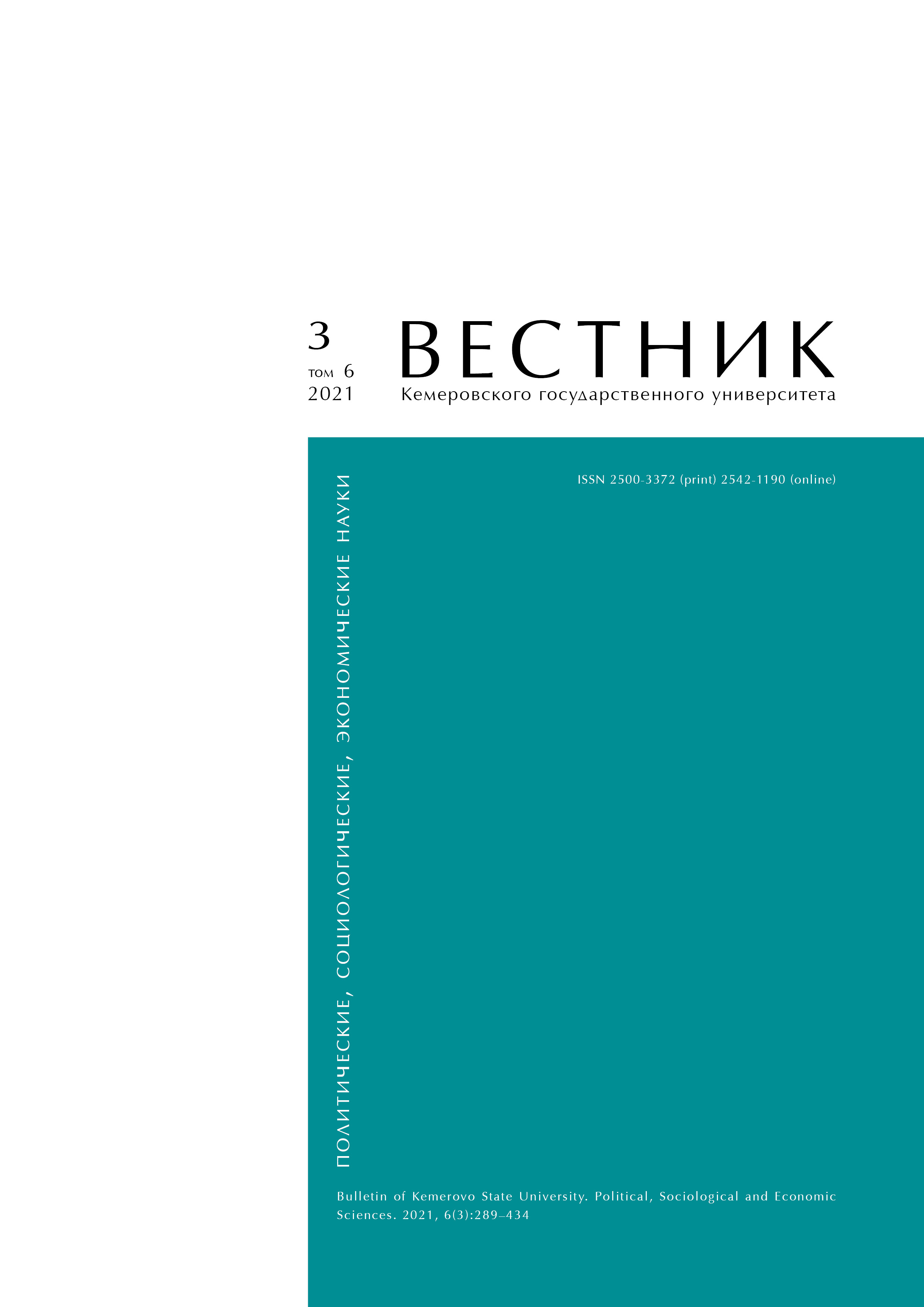Kemerovo, Russian Federation
UDC 33
Technology entrepreneurs play a critical role in modern models of economic growth. At the same time, the features and development trajectories of technological entrepreneurship and gazelle firms in Russia differ from countries with mature market economies. The purpose of the article is to assess the state of academic technology entrepreneurship in Russian universities and to develop recommendations for its development. The methods of two-dimensional classification of universities according to two indicators of technological entrepreneurship development, correlation analysis, assessment of intergroup differences according to the Mann-Whitney U-criterion, qualitative analysis of entrepreneurial ecosystems in universities, methods of constructing algorithms were used. As a result, it was found that the number of start-ups and the likelihood of receiving commercial funding are practically not correlated. There is a group of universities that are not among the largest metropolitan universities, but have a high proportion of entrepreneurial projects that have successfully passed the seed stage and received commercial funding (business angel, venture fund). These top performing universities are distinguished not only by their innovative infrastructure, but also by a wide variety of community centers. Taking into account the results obtained an algorithm for the development of academic technological entrepreneurship on the basis of the university as an innovation hub has been developed. Its important elements are: pre-active marketing of scientific research groundwork, development of the social capital of the ecosystem, and collaboration practices. The results may be of interest to technology entrepreneurs themselves, as well as to universities interested in the development of academic entrepreneurship.
technological entrepreneurship, academic entrepreneurship, innovation hub, university, innovation infrastructure, student startup, scientific and technical groundwork
1. Birch D. L. Job creation in America: how our smallest companies put the most people to work. N. Y.: Free Press, 1987, 244.
2. Jones-Evans D. Technical entrepreneurship, experience and the management of small technology-based firms-exploratory evidence from the UK. Entrepreneurship & Regional Development, 1997, 9(1): 65-90. https://doi.org/10.1080/08985629700000004
3. Jovanovic B. New technology and the small firm. Small Business Economics, 2001, 16(1): 53-56. https://doi.org/10.1023/A:1011132809150
4. Subrahmanyam M. H. B. Comparing the entrepreneurial ecosystems for technology startups in Bangalore and Hyderabad, India. Technology Innovation Management Review, 2017, 7(7): 47-62. http://doi.org/10.22215/timreview/1090
5. Wells J. The role of universities in technology entrepreneurship. Technology Innovation Management Review, 2012, 2(4): 35-40. http://doi.org/10.22215/timreview/549
6. Volkov S. K., Akimova O. E. Flagship universities as centers of technological entrepreneurship development. Universitetskoe upravlenie: praktika i analiz, 2019, 23(3): 30-39. (In Russ.) https://doi.org/10.15826/umpa.2019.03.017
7. Glukhikh P. L., Krasnykh S. S., Osintsev S. I. Enhancing the export potential of small and medium-sized technological entrepreneurship in the region. Ekaterinburg: Institut ekonomiki UrO RAN, 2019, 118. (In Russ.)
8. Glukhikh P. L., Myslyakova Yu. G., Malysheva E. V., Krasnykh S. S. The relationship of the region's export potential and the start-up movement of the youth. Ekonomika regiona, 2018, 14(4): 1512-1525. (In Russ.) http://doi.org/10.17059/2018-4-35
9. Stepanenko D. A., Pereligina L. B. Technological entrepreneurship as driver of structural changes of labor market. Zhurnal pravovykh i ekonomicheskikh issledovanii, 2020, (2): 137-141. (In Russ.) http://doi.org/10.26163/GIEF.2020.29.43.021
10. Schaeffer P. R., Fischer B., Queiroz S. Beyond education: the role of research universities in innovation ecosystems. Foresight and STI Governance, 2018, 12(2): 50-61. http://doi.org/10.17323/2500-2597.2018.2.50.61
11. Xu G., Wu Y., Minshall T., Zhou Y. Exploring innovation ecosystems across science, technology, and business: a case of 3D printing in China. Technological Forecasting and Social Change, 2018, 136: 208-221. http://doi.org/10.1016/j.techfore.2017.06.030
12. Byers T. H., Dorf R. C., Nelson A. J. Technology ventures: from idea to enterprise, 4th ed. N. Y.: McGraw Hill, 2014, 624.
13. Giones F., Brem A. Digital technology entrepreneurship: a definition and research agenda. Technology Innovation Management Review, 2017, 7(5): 44-51. http://doi.org/10.22215/timreview/1076
14. Tolmachev D. E., Chukavina K. V. Technology entrepreneurship in the Russian regions: educational and geographical paths of start-up founders. Ekonomika regiona, 2020, 16(2): 420-434. (In Russ.) http://doi.org/10.17059/2020-2-7
15. Belkin V. G., Babak L. N., Khegay E. V., Filatkina I. D. The development of academic entrepreneurship in some countries of the Asia-Pacific (overview of scientific publications). The Bulletin of the Far Eastern Federal University. Economics and Management, 2016, (2): 99-111. (In Russ.) http://doi.org/10.5281/zenodo.58328
16. Sysoeva O. V. Development of academic entrepreneurship in the system of innovation models. Journal of New Economy, 2019, 20(3): 83-100. (In Russ.) http://doi.org/10.29141/2658-5081-2019-20-3-6
17. Azimov T. A., Beznoshchuk L. Yu. Approaches to the definition of "academic entrepreneurship". Finansovaia ekonomika, 2018, (6): 1259-1261. (In Russ.)
18. Izmailov A. M. Academic entrepreneurship in the light of impact of the main trends of development of the educational system in Russia. The Bulletin of the Far Eastern Federal University. Economics and Management, 2019, (4): 103-109. (In Russ.) http://doi.org/10.24866/2311-2271/2019-4/103-109
19. Babak L. N., Khegay E. V., Belkin V. G. Academic entrepreneurship: an analysis of factors affecting scientists' decisions to start an entrepreneurial career. Izvestiya Yugo-Zapadnogo gosudarstvennogo universiteta. Seriya: Ekonomika. Sotsiologiya. Menedzhment, 2019, 9(5): 51-77. (In Russ.)
20. Karpov A. O. Is university 3.0 feasible in Russia? Sotsiologicheskie issledovaniya, 2018, (9): 59-70. (In Russ.) http://doi.org/10.31857/S013216250001959-7
21. Korchagina I. V. Developing a "soft" component of innovative ecosystems in flagship universities. Universitetskoe upravlenie: praktika i analiz, 2020, 24(1): 106-118. (In Russ.) http://doi.org/10.15826/umpa.2020.01.008
22. Tkachenko I. N. Rethinking the stakeholder approach to corporate governance amid the coronavirus crisis: from commitment declaration to applied models. Upravlenets, 2021, 12(2): 2-16. (In Russ.) http://doi.org/10.29141/2218-5003-2021-12-2-1
23. Plakhin A. E., Ogorodnikova E. S. The asymmetry of the income distribution of stakeholders within the park structures. Nauchnye trudy Volnogo ekonomicheskogo obshchestva Rossii, 2018, 211(3): 514-524. (In Russ.)
24. Plakhin A. E. The duality of stakeholders position as the basis for the industrial park structures management. Russian Journal of Innovation Economics, 2019, 9(1): 167-174. (In Russ.) http://doi.org/10.18334/vinec.9.1.39797
25. Solyanik S. A., Kravets O. Ja. Models and algorithms for operational control of probabilistic processes in a multilevel specialized system. Informatsionnye tekhnologii modelirovaniia i upravleniia. 2016, 100(4): 305-320. (In Russ.)

















